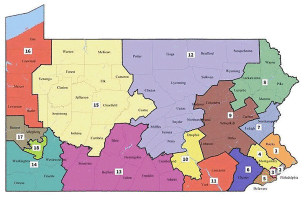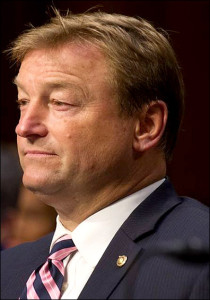By Jim Ellis — Monday, July 10, 2023
Senate
Michigan: Ex-Congressman Testing Senate Waters — Former Congressman Mike Rogers (R), who served in the House from 2001 to the beginning of 2015 and chaired the House Intelligence Committee for four years, is reportedly considering entering the open US Senate race.While Democratic Rep. Elissa Slotkin (D-Lansing) is the early favorite for the party nomination and to win the seat, Rogers would probably be the strongest candidate the GOP could field and certainly puts the open seat in play. Other potential Republican candidates are businessman John Tuttle and former US Rep. Peter Meijer. The only announced significant GOP contender is Michigan Board of Education member Nikki Snyder.
While Rep. Slotkin is favored in the Democratic primary, she does have credible opposition. Michigan Board of Education President Pamela Pugh is in the race along with former state Rep. Leslie Love and attorney Jacquise Purifoy. Actor Hill Harper is also expected to announce his candidacy soon.
The Michigan Senate race is now getting more interesting. The seat is open because Sen. Debbie Stabenow (D) is retiring after serving what will be four terms.
Ohio: Poll Shows Close Race — The Ohio Senate race will be one of the premier 2024 electoral contests and is considered a must-win for Republicans. Sen. Sherrod Brown (D) seeks a fourth term, but this may be his toughest campaign as the state has shifted considerably to the right since he was last on the ballot in 2018.
East Carolina University recently polled the state (June 21-24; 805 registered Ohio voters; interactive voice response system & online), and their results find Sen. Brown locked in a tight race no matter who becomes the Republican nominee. While slightly leading against all three tested Republicans, he is nowhere near 50 percent in any configuration.
State Sen. Matt Dolan (R-Chagrin Falls), a minority owner of the Cleveland Guardians Major League Baseball club, fares best against Sen. Brown, trailing only 45-44 percent. Businessman Bernie Moreno, despite not having universal name identification, is behind 46-42 percent. Secretary of State Frank LaRose, who is soon expected to become a Senate candidate, would come within 44-42 percent of Sen. Brown. In the Republican primary, LaRose holds a slight 17-14-7 percent lead over Sen. Dolan and Moreno.
House
CO-8: Potential Re-Match — The 8th District of Colorado is the new seat the state gained in national reapportionment and was designed as a politically marginal domain that stretches from the northern Denver suburbs to the city of Greeley. It performed as such last November, as now-Rep. Yadira Caraveo (D-Thornton) scored a close 48.4 – 47.7 percent victory from a voter pool that exceeded 236,000 individuals.
The losing candidate, state Sen. Barbara Kirkmeyer (R-Weld County), is likely to seek a re-match. One candidate who just announced that she will not run again is Thornton Mayor Jan Kulmann. She placed second to Kirkmeyer in the 2022 Republican primary. The 8th District is sure to host another hotly contested congressional campaign in 2024.
NE-2: Re-Match on Tap — Last November, Nebraska state Sen. Tony Vargas (D-Omaha) held Rep. Don Bacon (R-Papillion) to a 51.3 – 48.7 percent re-election victory. As expected, late last week Vargas announced that he will return for a rematch in 2024. Nebraska’s 2nd Congressional District is a swing seat that the FiveThirtyEight data organization rates as R+3, while Dave’s Redistricting App calculates the partisan lean at 50.1R – 47.1D.
The 2nd also figures prominently in the presidential race. Nebraska is one of two states — Maine being the other — where the congressional districts carry their own electoral vote. In 2020, the 2nd broke with the state and awarded its electoral vote to President Biden as he carried the district with a 52-46 percent margin, or some 22,000-plus votes.
We can expect heavy campaigning here for all races. In addition to the presidential and congressional campaigns, both US Senate seats will be on the ballot. While Sens. Deb Fischer (R) and Pete Ricketts (R) are secure for re-election, this district will be relatively tight even for them.




